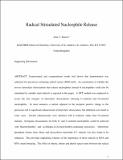Radical-stimulated nucleophile release
Abstract
Experimental and computational results have shown that deprotonation was enhanced for precursors containing radical centers (RED-shift). An examination of whether the inverse heterolytic dissociations that release nucleophiles instead of electrophiles could also be stimulated by suitably sited radicals is reported in this paper. A DFT method was employed to assess the free energies of heterolytic dissociations releasing C-centered and O-centered nucleophiles. In most instances a radical adjacent to the incipient positive charge in the precursors led to significant enhancement of heterolytic dissociation, but inhibition was found in some cases. Greater enhancements were obtained with C-centered rather than O-centered radicals. Exergonic dissociations for both O- and C-centered nucleophiles could be achieved with fluorenylmethyl- and cyclohepta-2,4,6-trienylmethyl-containing precursors. Heterolytic phosphate release from ribose and deoxyribose nucleotide C4' radicals was also found to be enhanced. This provided supporting evidence of the importance of these radicals in DNA and RNA strand breaking. The effect of ethyne, ethene, and phenyl spacer units between the radical center and the incipient positive charge was examined. Evidence was obtained that the key factor promoting heterolytic dissociation was the resonance stabilization of the coreleased radical-cations.
Citation
Walton , J C 2019 , ' Radical-stimulated nucleophile release ' , The Journal of Organic Chemistry , vol. 84 , no. 19 , pp. 12606-12616 . https://doi.org/10.1021/acs.joc.9b02159
Publication
The Journal of Organic Chemistry
Status
Peer reviewed
ISSN
0022-3263Type
Journal article
Description
J.C.W. thanks EaStCHEM for financial support.Collections
Items in the St Andrews Research Repository are protected by copyright, with all rights reserved, unless otherwise indicated.

